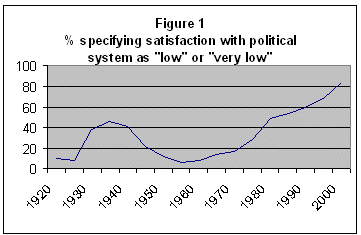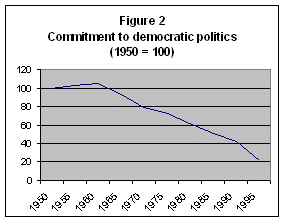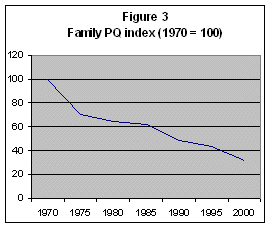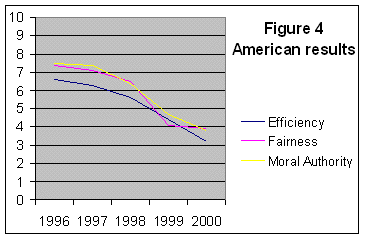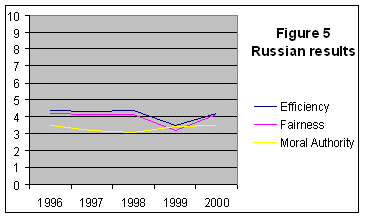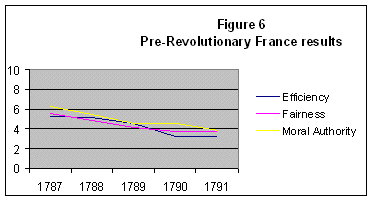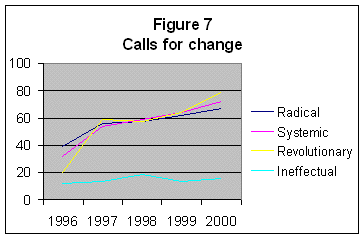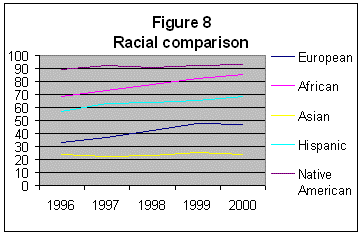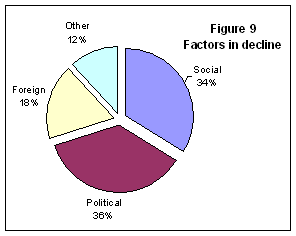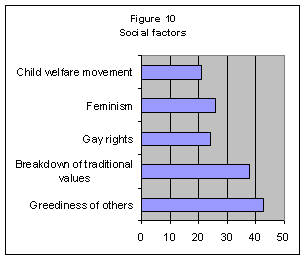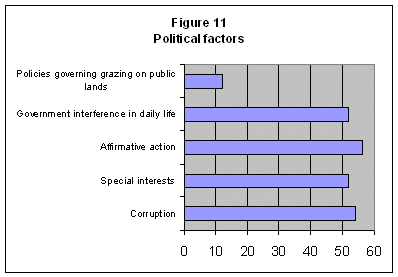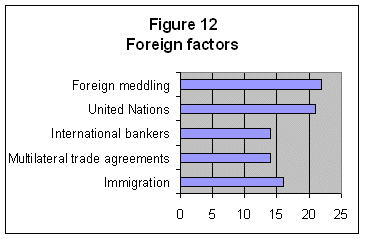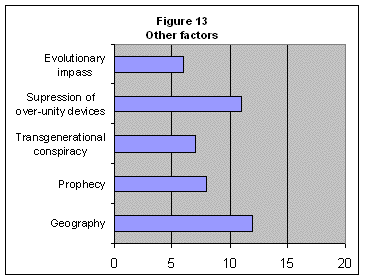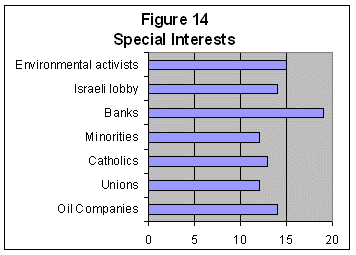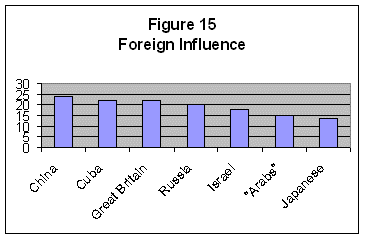
current issue
|
Though episodes of mass discontent with democratic
politics are not new, what is unique to our contemporary situation is the
breadth of dissatisfaction.
There is much anecdotal evidence suggesting that across racial, class, and
gender lines the American populace is tired of the Great Experiment in
popular rule, but until recently a statistically sound basis for such an
intuition has been lacking.
With the release of "The Hamilton Report,[1] [THR] policy
analysts and political scientists now have in their possession an
exhaustive study of the perceptions and attitudes underlying this collapse
of public confidence in democratic structures.
In one sense, THR affords a chance to perform an autopsy on the
American Dream. Though an
inquiry of this sort must necessarily be upsetting, the most knowledge is
gained by investigating a still warm corpse. Conservatives would be
wise to study this data, if only in hopes of garnering insights which may
be of use as the post-Constitutional era draws near.
Numerous studies have documented the erosion of public confidence in political institutions over the past thirty-five years.[2] The Garnett Group, for example, is engaged in a long-term effort to measure the degree of public satisfaction with the political system [Figure 1]. This annual sampling reveals unprecedented levels of unhappiness. Stephensburg, Thompkins, et al maintain an index of public commitment to democratic structures and process [Figure 2]; their research suggests that the American populace is ready, even eager, to embrace non-democratic alternatives. Flagg and Reilly take a slightly different approach, avoiding the pitfalls of self-reporting by interviewing students in an effort to discern the political sensibilities of their families [Figure 3]. Their results also suggest that a broad-based rejection of democratic principles is underway.[3] No matter the methodology adopted, the conclusions are consistent and clear: among the American public, there is a deepening distrust of democratic politics, increasing disillusionment with the day-to-day workings of civil society, and a growing willingness to consider alternate orderings of political life. The authors of THR focus on the past five years of American life, an era characterized by a shocking shift in public attitudes. Figure 4 reveals a steep decline along all axis by which the democratic process is judged, with levels of belief in the efficiency, fairness, and moral authority dropping by more than 50%. Public perception of the efficiency of democratic politics has always been subject to wide swings, dependent to a large degree upon the domestic policies of the ruling party, and subjective determinations of the fairness of democracy have also varied, correlating most closely with the performance of equity markets [4], but there has never been such a slackening of belief in the moral correctness of the democratic system. For purposes of comparison, Figure 5 gives data for Russia during the same period.> The evidence shows that the American population is as dissatisfied as the population of Russia, a declining Great Power ruled by an oligarchic elite! Of further interest are the extrapolated figures for Revolutionary era France, given in Figure 6: note that the state of the American public is remarkably similar to that of 1789 France. How can it be, in an era of general prosperity and peace, that the citizens of the world's most advanced democracy should exhibit such disdain for the very system which has made them so wealthy? Such levels of unhappiness, though certainly not conducive to the long-term health of the polity, are not themselves cause for immediate action; what is alarming are the results given in Figure 7. Respondents were asked whether or not they agree with the statement, "I believe that [adjective] change in the American political system is necessary." Over 60% agreed with the statement when "radical," "systemic," or "revolutionary," change was described, as opposed to the approximately 15% who consistently indicated agreement with control terms such as "ineffectual." Figure 8 provides a racial breakdown of those specifying a need for "radical," "systemic," or "revolutionary," change. As expected, such sentiments have traditionally been high among Native Americans and low among persons of Asian descent, but the steady growth of such views among Hispanic and persons of African descent is troubling, in light of recent gains by such groups in average household income, infant mortality, and education. Most confusing is the doubling of the rate of such beliefs among the European descended populace; THR does not explore the conditions causing such a shift, but one is tempted to speculate: changing mass media presentations of the political process? A critical mass achieved by the anti-government movement? Government policies provoking an increase in 'white rage'? Respondents indicating a belief in the need for radical transformation were asked to rank a set of factors, identifying those perceived to be most responsible for the decline of American democracy. These factors can be grouped into four categories, and Figure 9 shows the distribution of cited factors among these categories. "Social" and "political" factors were held to be most responsible, followed by "foreign," and "other". Figures 10, 11, 12, and 13 identify the five most cited factors in each category. Persons specifying "special interests" as one of the factors in America's decline were asked to identify a maximum of three responsible entities; the results, given in Figure 14, indict a variety of organizations, from the traditionally left-wing unions to right-leaning multinational corporations. The similar rates at which entities of different political leanings were cited might be understood to reflect a general consensus that there is more than enough blame to go around. Also of interest is the "foreign meddling" category, and further inquiry yields the results given in Figure 15: as one might expect, Communist China and Cuba were most often cited, with a (perhaps) unexpectedly strong showing by Great Britain. This may be nothing more than a statistical artifact, or it may reflect a heretofore unrecognized level of unease with the Special Relationship which has long typified the Anglo-American circumstance. Analysis of the data also reveals that individuals identifying China or Cuba as factors in the decline of America were more likely to identify "prophecy" or "international bankers" as further contributing factors. THR presents a picture of a population which has lost faith in democratic structures, the blame being apportioned between fellow citizens and foreigners. Though not explicitly stated in THR, once can not help but draw the conclusion that the final unraveling of Constitutional authority in the United States will take place in the near future, with the exact timeframe being determined by the business cycle.[5] Given such an endgame, THR may be most valuable as a guide for those who hope to define the next American state; in particular, the report suggests three distinct failures on the part of the political establishment and public, and it seems clear that any post-Constitutional arrangement, if it is to avoid the end befalling our current system, must explicitly address these failures: First, there has been a failure on the part of the state and political apparatus to properly manage public perceptions and attitudes vis-a-vis democratic politics and process. For some time there has been a growing suspicion among conservative policy analysts that the infamous "Midnight Compromise" of 1788, which led to the First Amendment and the enshrining of free speech as sacrosanct, was a tragic mistake. The consequences of this betrayal of conservative principle are with us today: a weak state, unable to effectively address dissenters within the American populace, lacking the tools to properly manage the presentation of news and issues[6], and at great pains to avoid offending a constitutionally-protected class of pornographers whose deleterious impact upon American society is undeniable[7]. Clearly such challenges can be met only by a rethinking of "free speech", in both theory and practice. If some sort of speech protection must be formalized within a constitution[8], explicit categorization of classes of speech may be preferable to the more generalized schema described in the First Amendment[9]. It should be clear that any such system must lend greatest protection to commercial speech, and least protection to the political. It may also be advantageous to further differentiate among types of commercial speech, privileging consumer advertising over business-to-business exchange, for example. Such a tiered system of speech need not grow unwieldy, provided a mechanism for efficiently resolving challenges to government classification of speech is also put in place. One might even argue that an explicit category of "individual" speech is in order, covering those acts not clearly falling within the commercial or political (such as intrafamily communications), but the need for such a classification is not yet clearly established. Second, there has been a failure on the part of the political elite to fully pursue the interests of the American state. At home, the stifling influence of entities as diverse as civil rights organizations, gun owner groups, and credit unions has only served to reinforce the mistaken perception that the interests of the state can be distinguished from those of the people. Abroad, it is clear that the United States fumbled an opportunity to establish a long-term global hegemony in the years immediately following World War II through well-intentioned but misdirected efforts to advance abstract notions of human rights and internationalism. For this reason, any post-Constitutional state must possess the will and resources to vigorously, even selfishly, pursue its interests, and this will require rethinking two of the fundamental tenets of contemporary policy: The arbitrary distinction between foreign and domestic operations, especially in regards to military and security operations, must be abandoned. In this Virtual Age, threats to the state recognize no boundaries; the force multiplying nature of the Internet allows a one-room office equipped with a fax machine to pose a more serious threat to national security than a battalion of soldiers. Social and technological forces conspire to undermine the very legitimacy of the modern state, and so the political establishment must not be hampered by nineteenth-century notions sovereignty and restraint. Of equal import, a future post-American state must immediately renounce all multilateral commitments and obligations. The network of relationships built on multilateral agreements has proven a failure; it is clear that just and verifiable terms come only through bilateral efforts between states, and that any other set of arrangements can only prove harmful to American interests. Third, and perhaps most important, the American population has failed to recognize and fulfill its duties as citizens. Blame does not rest solely with the individual; the state, too, has failed, inasmuch as it has an obligation to encourage the cultivation of requisite democratic traits. What is needed is a means of more closely linking the rights of citizenship to fulfillment of the responsibilities of citizenship. Ideally, any solution should also allow for the natural variations within a population, recognizing the benefits to be gained from assigning greater rights and responsibilities on the basis of income, property holding, and education. [10] Immigration reform is an essential element of any reform program. The existing system, in which citizenship is apportioned by lottery, must be replaced by a more economically rational mechanism: an auction. It is in the state's interest to encourage the immigration of those individuals placing the highest value on citizenship; given the multi-tiered system of citizenship described above, such persons would have the greatest incentive to fulfill the duties of citizenship, lest a change in citizenship status cause a decline in the value of their investment. This brief review touches upon only a small fraction of the material within THR. Space constraints prevent even a cursory review of other key points; the data linking early childhood sexual experience to adult political leanings, for example, is remarkable, not least for its statistical soundness. Policy analysts of any political stripe will benefit from an encounter with THR; conservatives, in particular, will find it to be an indispensable resource and a reliable foundation for any future political program. Given the present state of the Republic, THR arrives not a moment too soon.
[1] DeWitt
Foundation [1999].
[2] Various
authors have attempted to discern external factors accounting for this
decline: Goodman, Krugman, et. al [1994] attempt to link the movement to
changing perceptions of the Presidency; Meijers [1997] postulates a link
between public confidence and GDP growth; Sommerveld [1998] documents
correlations between public attitudes and levels of greenhouse gas
emission.
[3] It should be
noted that researchers have begun investigating the applicability of
epidemiological tools modeling the spread of highly contagious diseases
among captive populations to datasets in the public policy realm.
It is thought that such efforts may further understanding of the
spread of radical and non-mainstream political views.
[4] Wilson,
Breakman [1997] identified a strong link between mutual fund performance
and respondents willingness to characterize democratic institutions as
"fair" and "just." Wilson:
"The arc of the market is towards justice."
[5] This may, in
fact, account for the otherwise inexplicable actions of the Federal
Reserve during the past decade.
Perhaps Alan Greenspan and his cohorts are staving off the
inevitable downturn in the business cycle by dumping cheap money into
the economy-or, just as likely, they really are as ignorant of basic
economic and fiscal theory as their behavior suggests.
[6] The failure
of the tools available to the state apparatus for presentation and
management of information was evident even before the advent of the
Internet-driven mediasphere we now inhabit.
Case in point: The Gulf War.
Though often cited as a triumphant demonstration of the state's
ability to manage both the form and content of the nightly news, the
Gulf War was, in fact, a complete and utter failure, as numerous
internal DOD reports make clear.
Though public perception DURING the conflict was adequately
managed, the system of control and direction broke down completely after
the allied forces declared victory. Numerous studies have shown that the American public now
believes that the war was a failure, that it was fought simply to ensure
a supply of cheap oil to the Western democracies, and that any
pretensions to humanitarian motives were made bankrupt by the failure to
remove Saddam Hussein as leader of Iraq and the abandonment of the
Kurdish insurgents. Such a turn in public opinion, in direct contradiction to the
wishes and efforts of the political establishment, is surely a sign of a
too-weak state.
[7] The obvious
example of Hollywood should suffice.
It is interesting, though outside the scope of this piece, to
contrast the influence wielded by the American state over Hollywood with
that of Delhi over Bollywood.
Prosecutions for obscenity [or the mere suggestion of it] are not
uncommon in Bombay; for this reason, Indian films exhibit a much higher
level of morality than the products of the American entertainment
complex.
[8] And such a
need is certainly arguable: in polls, Americans consistently indicate,
"freedom of choice in the marketplace," and, "the right of each citizen
to have access to sufficient credit," as two of several theoretical
rights in exchange for which they would surrender their First Amendment
speech protection.
[9] Which,
obviously, has given rise to a tiered system of speech, but this system
has come about through the actions of the courts, explaining the
absurdity of our present situation.
[10] Other
factors may also play a role.
The astute reader will note that the system described is similar
to the property and education requirements specified in Colonial America
and the Reconstruction era South.
These earlier models suffered from a lack of flexibility; the
enforcement of a single class of citizenship, unattainable by most, only
served to fuel resentment among the excluded.
The policies of a more enlightened state must inevitably
recognize that the appearance of justice is often more important than
the enforcement of just arrangements.
|
|
